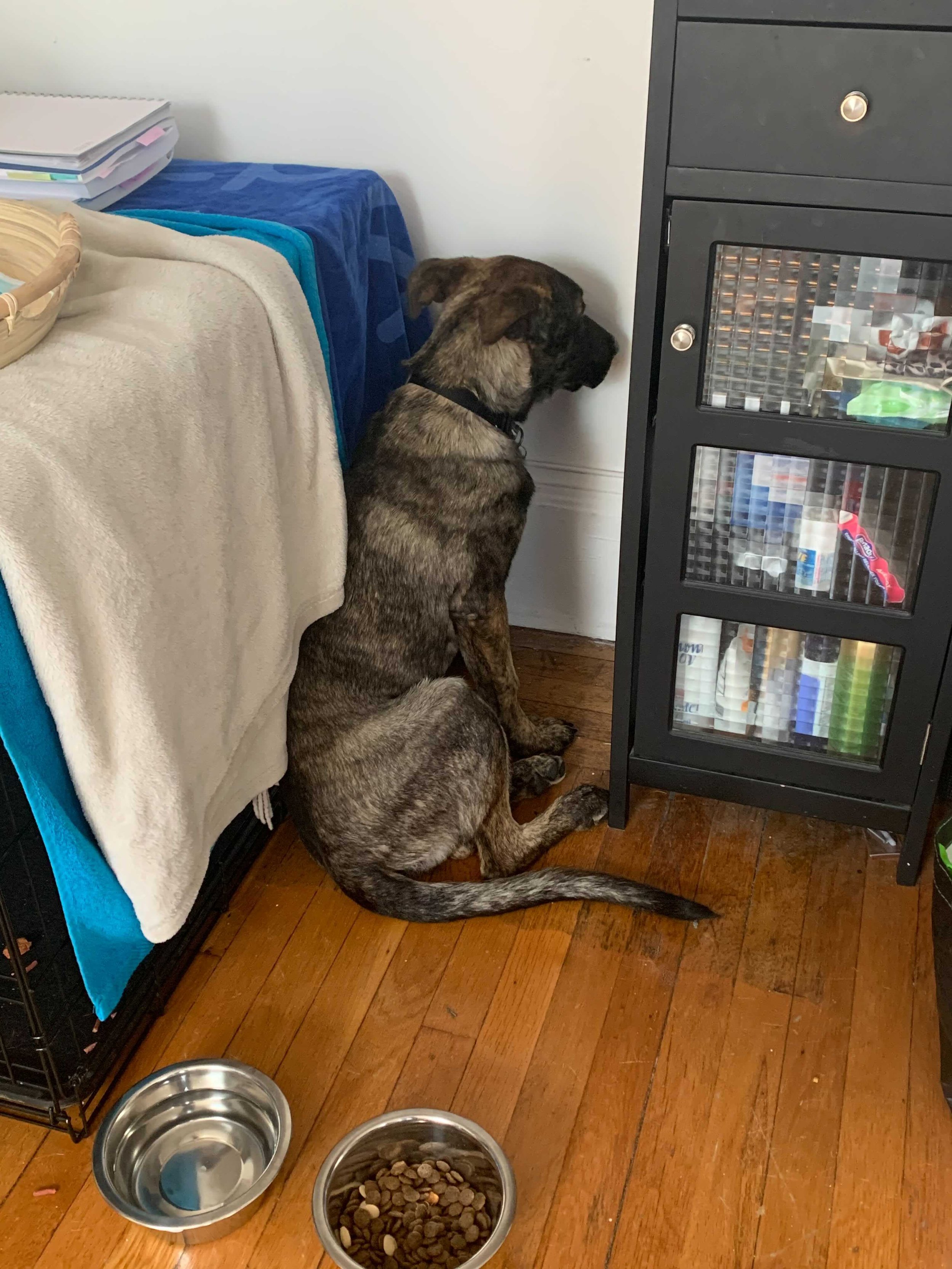Fostering a Dog with Parvo
On a sunny day in July, that magical e-mail arrived. “Meet your match! We’ve handpicked Gisela just for you!” A furry 5-month-old shepherd mix coming in at a whopping 45 to 50 pounds, I took one look at Gisela’s sweet, brown eyes and got to work prepping for her arrival. She was only our second foster, but with one happy story under our belt, we were more than ready to help this girl find a home. There was no doubt in my mind she’d be scooped up quickly, and I wanted to make the most of our time together, showing her all the comforts of a loving home. By Saturday, the scruffy girl with long limbs that she couldn’t quite control yet came barreling into our doorway.
We knew what to expect with puppies – the boundless energy, sloppy kisses, and chasing them around the house with our slippers dangling from their mouths. All the best and worst things of having an exuberant little one in our midst. But by Saturday evening, it was clear something just wasn’t quite right.
Her initial signs were unassuming and came on in quick progression. The appetite we expected from this quickly growing girl was mysteriously absent. Despite plenty of playtime, even water didn’t seem to pique her interest. As the following hours passed, Gisela became noticeably lethargic. Her spunky personality dimmed to nothing but a murmur as she lazed on the floor next to the couch, barely lifting her head, enticed by neither treat nor toy. With urging, we got her to take a few bites of kibble and some water. With that, things took a turn for the worse. Anything the poor dog consumed came right back up.
My radar flashed red and I reached out to the Muddy Paws team right away to let them know that something was wrong. My thought at first was just typical anxious dog syndrome. Maybe she needed time to settle, maybe she’d snap out of it. So we waited.
Sunday rolled around and her disposition grew grim. I’ll be the first to admit I shed a few tears of panic, but we persisted – holding off to monitor in the hopes things would be on the up and up soon.
By Monday, I was confident the issue stretched far beyond just anxiety, and the MPR team agreed. One frantic Uber ride and a few stressful hours outside the vet confirmed our fears: it was parvo.
What is parvovirus?
Parvo is a highly contagious virus that primarily impacts young, unvaccinated, or partially vaccinated puppies. It’s transmitted easily through direct contact with an infected dog (sniffing, licking) or indirectly when the puppy comes into contact with a human, food bowl, collar, or other objects that have been exposed to a dog with parvo. It largely impacts the gastrointestinal system, but can spread rapidly to other tissues, organs, or even bone marrow, which is why it’s imperative to both vaccinate your pups and seek medical attention as soon as there is a show of concern.
What symptoms should I look for?
Diarrhea (sometimes bloody)
Vomiting
Fever
Lethargy
Anorexia/Loss of appetite
Weight loss
Weakness
Dehydration
Depression
Treatment
If you suspect your foster dog has parvo, let the MPR team know immediately so they can contact a vet! Upon assessment, the vet will be able to diagnose through clinical signs and a fecal test. Though there is no cure, supportive care from veterinary staff can save your pup’s life! They’ll make sure your pup stays hydrated and is still getting the nutrients they need. Antibiotics may be given to prevent infection, as parvo will make them more susceptible to other illnesses.
Precautions & Prevention
There’s no easy way to say it – parvo is a serious, potentially even fatal, illness. Progress can be sporadic, but pups that push through those first few days are more likely to make a full recovery. Being proactive is vital to the success, health, and survival of a dog with parvo.
The best way to keep your puppy (or foster puppy) safe is vigilance. Restrict contact with any unvaccinated dogs until all vaccines and boosters have been administered. Keep partially vaccinated puppies on short outdoor walks with no contact, and be highly mindful of what they sniff or touch while outside. Socialization is important, but safety always comes first!
If you’ve had a parvo-positive pup in your home, get to cleaning. Bleach what you can, and search for parvo-specific virus-killing cleaners for all unbleachable surfaces like couches or rugs. Wash and disinfect blankets and other materials on a hot cycle to prevent reinfection or spread. Those parvo particles are resistant to cold, humidity, drying, and heat alone, and can survive on surfaces for a very long time. And, of course, let your Foster Buddy and the MPR team know if you have any questions!
What to Expect in Recovery & Beyond
Depending on the severity and how early the virus was caught, some parvo-positive pups can be treated at home, while others might spend several days to a week at the vet. Our sweet Gisela spent a whole 5 nights with brilliant vets who brought her back to life, and we were so grateful for their attention & compassion. Ease pups back into their normal diet with small meals, gradually increasing back to their full serving as their stomachs begin to settle again. Continue tracking their bowel movements to monitor when stool returns back to normal. With proper care & attention, your pup should be back to their happy self within 1-2 weeks.
A Very Happy Ending
With our early detection of parvo in Gisela, MPR was able to immediately contact the fosters caring for the rest of her littermates and get them treated before they even exhibited any symptoms, potentially saving the lives of all her brothers and sisters as well. As the days passed after her return from the vet, Gisela was quick to get her spark back. Her love of squeaker toys and a good game of tug of war was a delight and her goofy personality got to shine in all its glory. Because of her recovery, Gisela stayed with us longer than anticipated – a whole 5 weeks! So when the day finally came for her adoption meeting, I knew saying goodbye would be emotional.
But luckily…I didn’t have to. Turns out her adoptive parents couldn’t have been cooler. We were lucky enough to form a bond with them, and Gisela (now known as Ella) forged a strong connection between us.
Ella is now a happy, healthy, 80-pound pile of love and affection. She loves being outside (especially in the snow), and the speed at which she can destroy a squeaker toy could land her in the Guinness Book of World Records, I’d bet.
Our journey together through this challenging illness solidified something special between us. It was scary but unbelievably rewarding. It prepared me for anything, and I became a better foster because of it. It also really heightened my Google skills….
Above all, I love getting to be Ella’s doggie godmother, watching her grow up and show off just how amazing she truly is.
LK Alves is a Muddy Paws foster, adopter, and Foster Team member.









